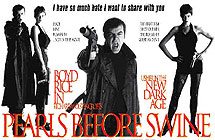|
|
|
|
Pearls
Before Swine
|
 |
|
Since 1990, it has been the case that the world's very greatest filmmakers (including Abbas Kiarostami, Hou Hsaio-hsien and Maurice Pialat) cannot manage to crack a theatrical release in any Australian "boutique" arthouse cinema. Meanwhile, a silly, inept, tedious, local movie called Pearls Before Swine opened the inaugural Melbourne Underground Film Festival (naturally, MUFF for short) – which spread itself over three arthouse cinemas – in 2000. Is this what we laughably call our film culture? MUFF is, to be sure, an impressive initiative speedily organised by Richard Wolstencroft, director of Pearls Before Swine. As he tells the tale, it was the rejection of his film from the Melbourne International Film Festival – an eminently sensible decision, in my opinion – that spurred him to gather the latest, neglected, subterranean works of Australian film. I can admire this gesture. I have long been an avid supporter of underground film. But, in claiming the underground label, this event offers a disgraceful distortion of cinema history. True underground figures – such as Kenneth Anger, Carolee Schneemann or George Kuchar – have never expended much energy slagging off establishment funding bodies, industry professionals or paid critics. They were too busy making the work and finding an audience. Genuine underground cinema is so far beyond the mainstream – in its content and form, its means and sensibility – that it inevitably creates its own sphere of production and reception. The Melbourne underground on show here, however, has very little to do with radically queer cinema, experimental art or authentically anarchist politics. These films are, for the most part, simply ultra-low budget genre exercises – horror, action and sex pictures that are exploitation rather than underground fare. The most grandly pretentious of the works on display in MUFF is, in fact, Pearls Before Swine – an incoherent, idiotic, excruciatingly bad film that revels in the kind of fascism espoused by naughty schoolboys: prurient shocks, tasteless jokes about the Holocaust and rape, po-faced appeals to "man's brutality", paranoid fantasies about State control, and nonsensical slogans about the coming New Dawn in art, life and sex. (What threatened to burst out as the film's least pleasant aspect – an ambiguous vein of anti-Semitism – was to be sadly confirmed three years later in the controversy surrounding MUFF's screening of Holocaust-revisionism videos in the name of free speech, accompanied by wound-up Wolstencroft rhetoric about something called "transcendental Fascism".) But Wolstencroft's catalogue essay for the first MUFF event gives the game away when – after the usual anti-establishment whine – he announces that, in the bright future, his chosen mates will be the ones receiving the funding and carving out great careers in Hollywood! Unfortunately, insufferable tortures like Pearls Before Swine and John Hewitt's Redball (1999) prove only that it takes more than bad attitude to be a talented (or even a sufficiently skilled) filmmaker, whether under or above the ground. © Adrian Martin July 2000/October 2003 |
![]()